
*
Having contributed his boyish charm to the TV series "Ed" and to films as varied as "Jeepers Creepers," "Live Free or Die Hard," and "He's Just Not That Into You," Justin Long is learning to be less likable as he makes his Broadway debut in Teresa Rebeck's Seminar at the Golden Theatre. As of April 3, Long has succeeded Hamish Linklater in the role of Martin, one of four aspiring young novelists, opposite Jeff Goldblum, who has replaced Alan Rickman as the group's acerbic but brilliant teacher. We spoke with the 33-year-old former "I'm-a-Mac" pitchman shortly before his first performance of an eight-week engagement.
How did you land the part of Martin in Seminar?
Justin Long: My agent knew I was looking to do more theatre, but theatre has not been always been high on the priority list for my representatives. My manager had been calling and calling about some pilot that I wasn't much interested in, so thank God I heard about this opportunity from Busy Phillips, who I was doing a movie ["A Case of You"] with in Brooklyn. I was actually familiar with the play because I had done a reading of it last summer, knowing that Hamish and those other guys were already cast. Once I realized that the producers were interested in me as a replacement, I aggressively pursued it.
As an actor who has had much success in television and film, what does it mean to you to be making your Broadway debut?
JL: I guess it's really always been a dream of mine, but it wasn't necessarily a goal, because it never seemed realistic. I first fell in love with acting through theatre, being in plays and going to plays. My mom was an actress when I was growing up, and she was always doing a play. What money she made was by doing voice-overs and stuff, but her heart was in the theatre. All of her friends were also working theatre actors, so that's just the environment I grew up in. I had no delusions of grandeur about acting, so I never thought I'd do anything in front of a camera. I thought that maybe, if I was lucky, I'd get an occasional episode of "Law & Order" or something, but my dream was to do theatre, and that's what I thought it meant to be an actor. I was lucky enough to get some breaks in films, and that sort of snowballed, and I didn't go back to theatre for 10 years.
| |
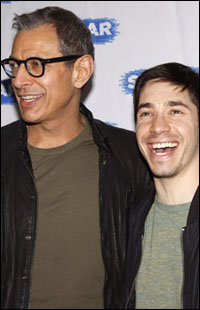 |
|
| Jeff Goldblum and Justin Long | ||
| photo by Joseph Marzullo/WENN |
JL: I really missed it. I had the opportunity to do the Williamstown Theatre Festival for the last couple of summers [Mat Smart's Samuel J. and K. and Lewis Black's One Slight Hitch], and the experience really reminded me just how much I missed and loved theatre.
You've actually been circling Broadway for years, participating in New York theatre institutions like Celebrity Autobiography and The 24 Hour Plays, plus MCC Theater's readings of Neil LaBute's Filthy Talk for Troubled Times: Scenes of Intolerance.
JL: Absolutely, I was trying to dip my toes in there, but it's not the easiest world to break into. Whenever I could, I would do reading or something, not so much as means to an end, but just because I really enjoy being on stage. I have a lot of friends who have consistently been doing plays in New York, and I also socially gravitate toward that whole world. I also enjoy watching plays. So yeah, I was flirting with it for a while.
| |
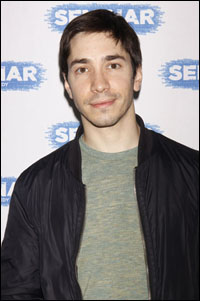 |
|
| Justin Long | ||
| Photo by Joseph Marzullo/WENN |
JL: I live in Austin part-time, so I go back and forth to New York, but when I am here and I'm not working, I try to see as much theatre as I can. Now, of course, there are so many things on Broadway that I want to see. It's funny, because I was talking with someone the other day about how desperate I am to see Death of a Salesman, and I caught myself almost saying, "Dammit, I won't be able to see that, because I'm on Broadway" — as if it's a bad thing.
Along with Jeff Goldblum and Zoe Lister-Jones, you're one of three new cast members joining Jerry O'Connell and Hettienne Park, Seminar's remaining original stars. What was the rehearsal process like for you?
JL: A lot of praying, a lot of watching tapes of Hamish and Alan Rickman… No, we were just trying to get through the blocking, most of which was already established, and learning the lines was daunting because we had so little rehearsal time. When I got the part, I had already committed to doing a few more episodes of "New Girl," so I had to go out to L.A. for a while. So for me — and I hate to sound trite — most of the rehearsal was about trying to solidify the lines in my head.
In addition to rehearsals, would you also attend the performances?
JL: I wanted to see the play out of sheer curiosity and also to help get the blocking down, but I didn't see it until after I had solidified my idea of the character and how I was going to play him. Seeing Hamish do it was surreal, because I knew the part in a totally different way. I had thought about seeing the play multiple times, but then I was so thrown by how different my interpretation of the part was, and I didn't want to fall even more deeply in love with what Hamish was doing. It was also terrifying, because it almost felt like his was the only way to do it, so I'm just hoping that my way works too. But there are parts of Hamish's performance that I don't think I could live without, so I may borrow them for a couple months. It's comforting to know how wildly different yet equally successful Alan Rickman and Jeff Goldblum are in the role of Leonard. I can't imagine two more disparate actors, but they're both just beautiful in such different ways.
Has it been easy to build up chemistry with the cast in such a short period of time?
JL: Yeah, well, you know who's been incredible is Jerry O'Connell. I've been hanging out with Jerry a lot. He and Hettienne came whenever they could to our rehearsals, ingratiating themselves into our little threesome of newbies. They've really gone out of their way to help us make the transition. I forgot that about theatre — how quickly you bond with people in such a short amount of time. There's pressure for all of us, and sometimes that pressure can be the best thing to galvanize relationships, especially for a play like this, which relies so heavily on the chemistry and the support between the actors. Establishing those connections was almost immediate, and I feel like we've gotten to a really good place. It also helps that everyone's a really good person. There are no divas or attitudes, which is surprisingly rare.
So you're confirming that Jeff Goldblum is not a diva.
JL: Jeff Goldblum is someone that could be a diva, because he's so successful and has had such a great career, but he works harder than I've ever seen an actor work. We had our first table read maybe a week after we'd been cast. I'd only been able to read the script a couple times at that point, because I was finishing up a movie ["A Case of You"] that I'd written and produced, so it was very consuming. I thought, Whatever, nobody else is going to be that prepared either. Goldblum was completely off-book, so analytical, already making choices — he could've gone onstage that night. It was incredible. That lit a fire under Zoe's and my ass and encouraged us to work harder. He's also very giving and he never complains. It's inspiring to see a guy who's gotten to that point in his career and is still so gracious and playful.
| |
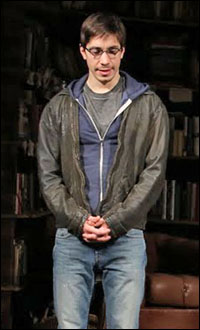 |
|
| Long takes a first-night bow in Seminar. |
JL: When it comes to the characters I'm usually asked to play, especially recently in romantic comedies, my instinct has been to be more likable, more self-effacing, softer, and more passive. But Martin is not that at all, and I was struggling with that at little bit. Martin's a selfish narcissist, and he can be very aggressive, hostile, and punishing, even to his close friends. Those aren't my natural instincts, so I've had to work against how I would normally play somebody like Martin. But watching Hamish in the role gave me the confidence to be unlikable.
Did you speak with Hamish for any insights into the character?
JL: Yeah, he was awesome. We sat and talked for a little bit. It was probably strange for him, because actors can be so sensitive, and there's a certain etiquette when it comes to giving notes or suggestions, but I let him know that I was open to anything he wanted to tell me. I've never done Broadway, so I'm looking for advice wherever I can get it. The questions I had were more specific about certain lines or certain things I was having trouble with, like this one scene where I have to shovel chips in my mouth and still articulate properly. I don't have the clearest diction anyway — maybe my tongue doesn't fit in my mouth — so I've had to be more cognizant of things like enunciating and playing to the back of the house, especially after doing film for so long. Hamish gave me some notes and tricks about things like that. He's just so thoughtful, analytical, and prepared, but onstage he makes it looks so effortless. Those are some big shoes to fill, and I wish they were a little smaller.
| |
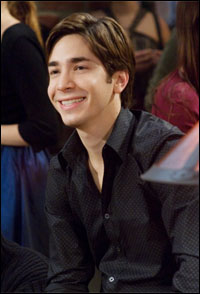 |
|
| Long in "He's Just Not That Into You." |
JL: As a kid, the last thing I wanted to be was an actor, because I heard my mother on the phone calls with the douchebag agents who wouldn't send her out on things, and I saw the way that casting directors treated her, and it killed me. She was so good and so positive, but I saw the reality of the business and how soul-sucking it can be. My mom was such a hard worker and loved acting so much, but she also had three boys. We didn't have the money to have a nanny constantly, so I remember running around New York with her to her auditions. In retrospect, I don't think I ever really appreciated how impressive that is. I know now what a drag it is to bop around from audition to audition, dealing with all the rejection. I know how hard it is without having a family relying on you and obnoxious little monkey-children with bowl-cut hairdos trailing you, complaining. The fact that she was able to balance all that and still be the greatest mother in the world? I don't think I'll ever truly understand how difficult that was.
You went on to study theatre at Vassar College, and you ultimately pursued an acting career, so the negative aspects of the business obviously didn't deter you for very long.
JL: When I first became an actor, what I knew about professional acting was the life of a working theatre actor. Whenever a kid says that they want to be an actor, 99 times out of 100 it's some version of "I want to be famous," but I always understood that you have to love acting. Even if you're doing regional theatre and making money from the occasional commercial like my mother did, that has to be thrilling for you; otherwise, you'll lose yourself, and you'll always be chasing some intangible, corrupt, empty idea. I was instilled with that mentality from an early age.
And with that humble, realistic mentality, you became a movie star, and now you're making your debut on Broadway.
JL: Well, the fact that I'm doing this play on Broadway is a fluke. I was lucky enough to do a bunch of movies, and I worked hard doing those movies, but I know that I'm not doing this play on Broadway because I've established myself as a great theatre actor. I'm not delusional about what this is. I know the reality of the situation, and part of it is this interview we're doing right now. As far as breaking into the theatre world, I haven't come close to paying my dues. That makes this all the more pressure-filled, because I know that it's a huge opportunity that people usually have to work for years and slowly build toward.
Despite your impressive TV and film experiences, your being on Broadway must be particularly special for your mother.
JL: Oh, she's so proud, and it is a different kind of pride, because this is real acting to her. She knows that doing a play is a real measure of a good actor, and Broadway is the ultimate showcase. I'm aware of how lucky I am to have this opportunity, I hope I can make the most of it, and I really want to make her proud. She gave up so much for me when I was a kid, and she sort of gave up her own dream, so I hope this makes up for that in some slight way. Me getting to do Broadway is as much for her as it is for me, if not more so. I would never have been able to do all this without her influence and without seeing all her hard work.
| |
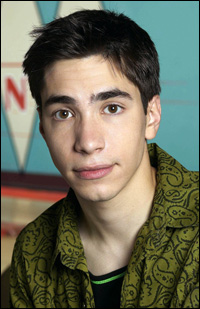 |
|
| Long on TV's "Ed." |
JL: I believe my first Broadway show was Peter Pan with Sandy Duncan, because my mom had stood-by for her in another show. It was probably 1980, so don't really remember it, but I think Peter Pan was the first one. Broadway's so expensive — although I really shouldn't say that in this interview — so it wasn't something we were able to do on a regular basis. I went to a lot of regional productions that my mom did at places like Rich Forum, the Connecticut Rep, the Long Wharf Theatre, and so on.
What was it like to watch her on stage?
JL: Seeing her doing a play was surreal. I remember being freaked out by her onstage because she seemed like such a different person, and that was really troubling for a kid like me who was so dependent on his parents. It was like when she did a series of Entenmann's commercials — my mom was like the Entenmann's lady for a while there in the '80s — and there was this one commercial where she was in bed with her husband, craving an apple turnover or something. It ran all the time, and it was such a thrill, but the kids at school started making a big deal about it, commenting on how weird it was that my mom was in bed with another guy. I didn't know anything about sex, so I didn't get how weird that was. I still kind of don't know anything about sex.
And now, all these years later, your mother gets to watch you onstage.
JL: I was running lines with her the other day, and she just brightened up. She's still heavily involved in theatre, and up until last year, she was running the theatre program at the junior high where she works, so I'm mostly excited for her to see me in this. There's nothing better than knowing that your parents are proud of you. There's also nothing worse than the idea that you might bomb onstage and make them not proud.
At this moment, as you're just embarking on your eight-week Broadway run, what's your main focus or concern?
JL: I feel like I should just start shoveling sashimi in my mouth and hope it's not too late to get mercury poisoning. [Laughs.] I remember when I was going off to do my first big movie, and I was doing a play [The Hot l Baltimore at Williamstown Theatre Festival] with Sam Rockwell, who has since become like a brother to me. It was a cheesy horror movie, but I was the lead in it, so I asked Sam for advice. I was looking for some meaty actor-y advice, but he said to me, "Treat it like you're doing Hamlet and take care of yourself." At the time, it seemed like such trite advice — what, get plenty of sleep and take your vitamins? But he was right. When it comes down to it, right now I'm just trying to take care of my body and relax as much as I can, because I don't want to get in my own way.









